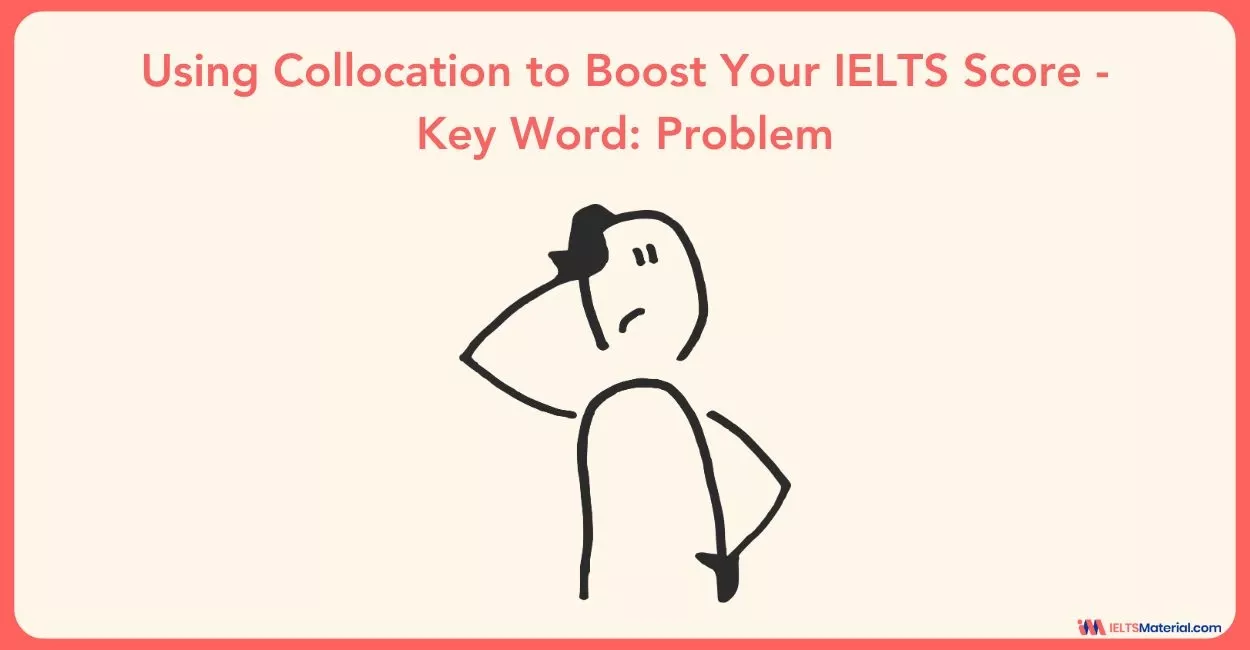Using Collocation to Boost Your IELTS Score - Key Word: Problem
5 min read
Updated On
-
Copy link
Check out this article on, "Using Collocation to Boost Your IELTS Score - Key Word: Problem" now and also get set to crack our expert-crafted practice exercises as well for an enhanced band score in no time!
Table of Contents

Limited-Time Offer : Access a FREE 10-Day IELTS Study Plan!
When you think of some of the most effective ways in order to improve your IELTS band score, it must be mainly in the Speaking and Writing modules, is by mastering collocations; which are just the combinations of words that naturally go together in the English language.
But a proper set of vocabulary for the IELTS exam does not just mean knowing a long list of words. The collocation “problem” is a common English collocation which is used to refer to one example, or reproduction of something mainly when that thing exists in many identical or similar forms.
A collocation is nothing but a pair or group of words which are often used together, just like the ones under the topic “problem.” Combinations like this will surely sound natural to the native speakers, and when you are using them correctly in your IELTS Speaking and Writing exam, it will show that you have a firm command of the English language.
In this blog, we will learn about this collocation of “problem” with the help of our expert crafted practice exercises that you can use in both academic and everyday English.
Connect with our IELTS Trainers to crack your IELTS exam in no time! FREE Demo!
Practice Exercise: Keyword - Problem
1 Verb + problem
Use the correct form of these verbs:
appreciate ignore pose have
wrestle with tackle solve flee from
- We’ve been ___________ a few problems with our air conditioning recently.
- Asylum seekers may be ___________ problems at home, but they often meet very serious problems when they finally settle somewhere else.
- No one has ___________ the problem of what to do with radioactive waste.
- We simply can’t afford to avoid the problem of teenage pregnancy. I think that we need to ___________ it head on.
- I fully___________ your problem, but I’m afraid there is little I can do to help you.
- Are you seriously suggesting that we should just ___________ the problem? Just turn a blind eye to it?
- The professor___________ the problem for weeks, but he finally had to admit defeat.
- I’m glad Dave and Gill and the kids are coming to stay, but it___________ the problem of where they are all going to sleep!
2 Common adjective collocations
Choose the more natural collocations below:
- Smoking seems a___________ problem among teenage girls, in particular. Every year more and more are getting hooked. (growing / rising)
- I’m afraid this is a very___________ problem which requires prompt attention. (serious / large)
- There are a number of reasons why Geoff is not suitable for the job, but the ___________ problem is that he is famous for rubbing people up the wrong way! (simple / basic)
- One of the most___________ problems facing cities today is traffic congestion. (pressing / important)
- I believe that traffic congestion in large cities is an ___________ problem. I can see no way round it. And it’s only going to get worse and worse. (unsolvable / insurmountable)
- I wish there was a simple answer to this issue, but it’s a very___________ problem, and it will require a complex solution. (complicated / complete)
3 Noun + preposition + problem
Use these nouns to complete the sentences:
extent answer root
nature approach view
- We must get to the___________ of this problem. We need to discover the cause of it before too much damage is done.
- There isn’t a straight ___________ to the problem because it just isn’t that simple.
- We aren’t getting anywhere. I feel we need to take a fresh ___________ to the problem.
- The full ___________ of the problem became clear when the pilots realized that the plane was almost out of fuel.
- We need to take an overall___________ of the problem. We need to consider all parts of it.
- If you think that our profitability will improve simply by making staff cuts, then you misunderstand the___________ of the problem.
| Notes
1. In 1-8‘create’is also possible. In 3-1 ‘bottom’ is also possible. 2. Note these expressions: This problem won’t just disappear overnight 3. If you think someone is going to disagree, you can ask: Do you have a problem with this? 4. Note the prepositions with ‘problem’: The government is looking for new ways to deal with the problem of homelessness. Unemployment is a serious problem for a lot of young people in this area. 5. Note that we use the expression ‘No problem’ to mean something is OK: Can you look after the shop for an hour or so? > No problem! 6. A ‘thorny problem’ is a difficult problem to which there is no obvious and easy solution. 7. Note these kinds of problems: personal problems / health problems / a drink problem / a weight problem / an attitude problem. 8. A ‘problem child’ or family is one which causes problems for other people. 9. Note the useful expression: ‘the only problem is’: The only problem with this car is it’s incredibly expensive! |
Answer Key: Keyword - Problem
Ex 1:
1 having 2. fleeing from 3. solved 4. tackle
5 appreciate 6. ignore 7. wrestled with 8. poses
Ex 2:
1. growing 2. serious 3. basic 4. pressing 5. insurmountable 6. complicated
Ex 3:
l. root 2. answer 3. approach 4. extent 5. view 6. nature / extent
Also check:

Start Preparing for IELTS: Get Your 10-Day Study Plan Today!
Recent Articles

Nitika Gupt

Nehasri Ravishenbagam

Nehasri Ravishenbagam





Post your Comments